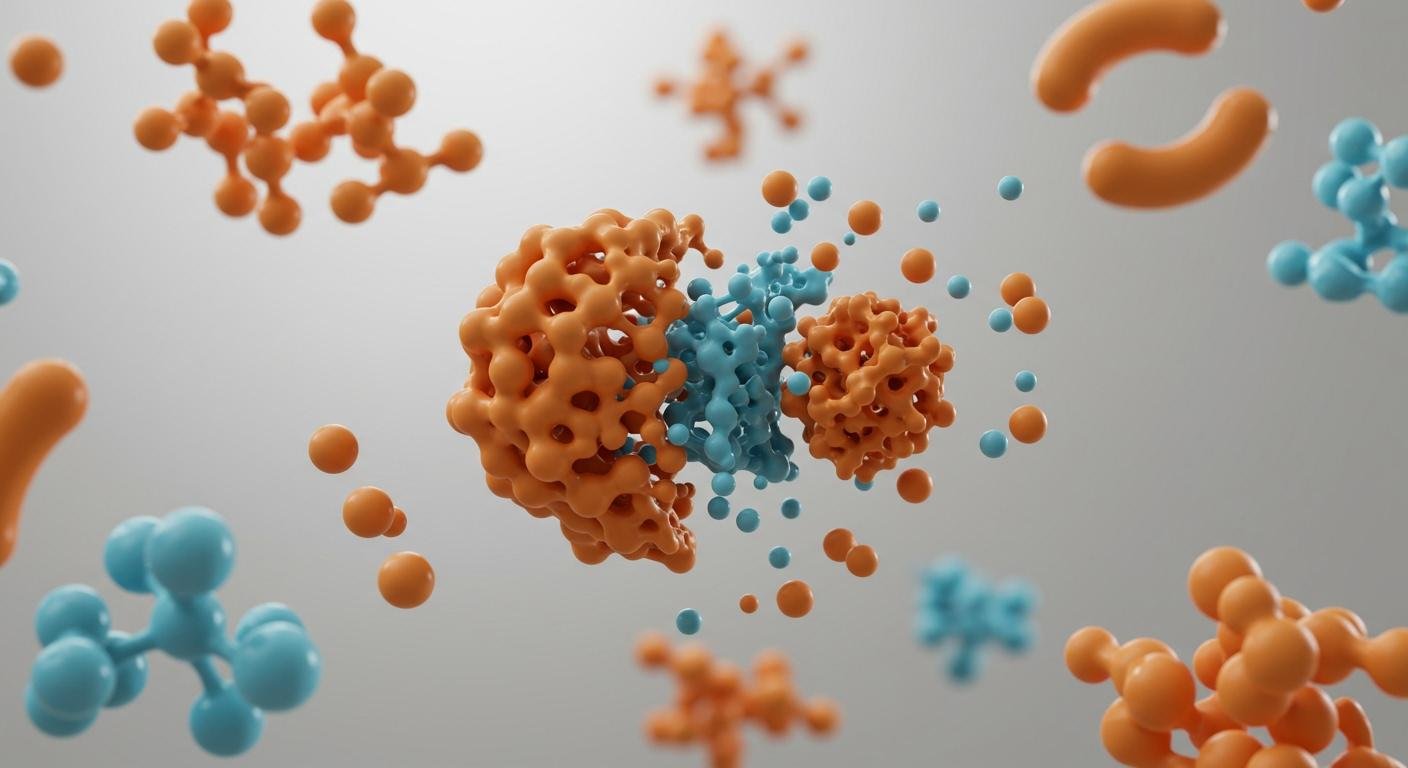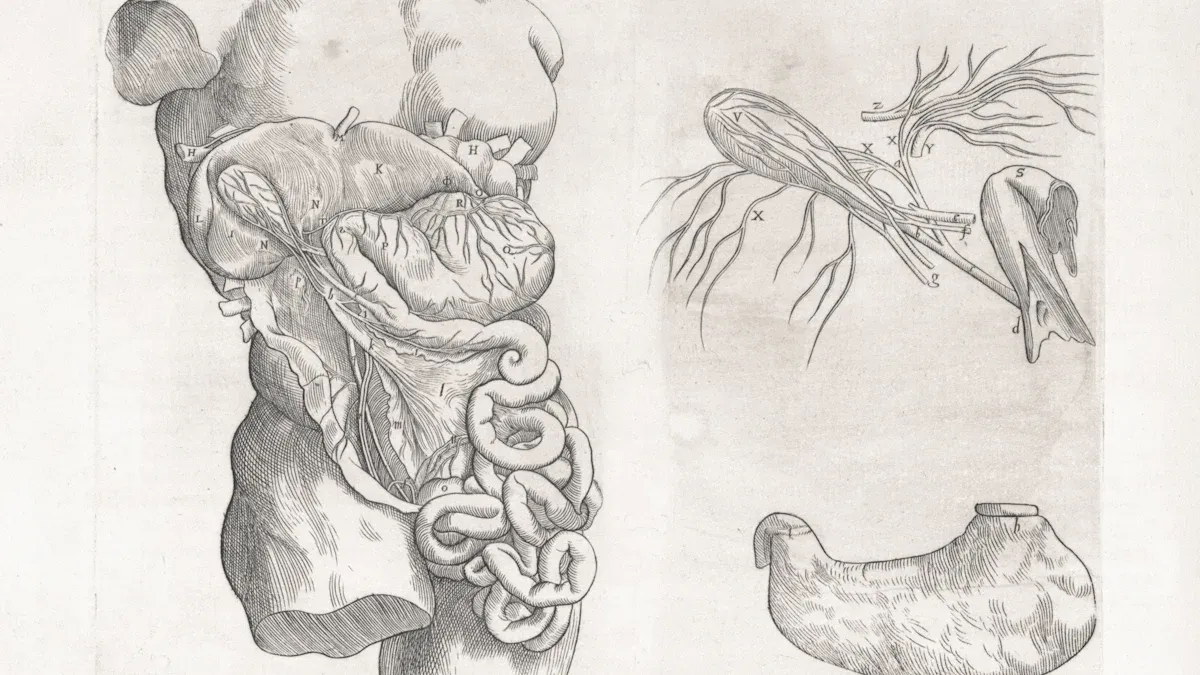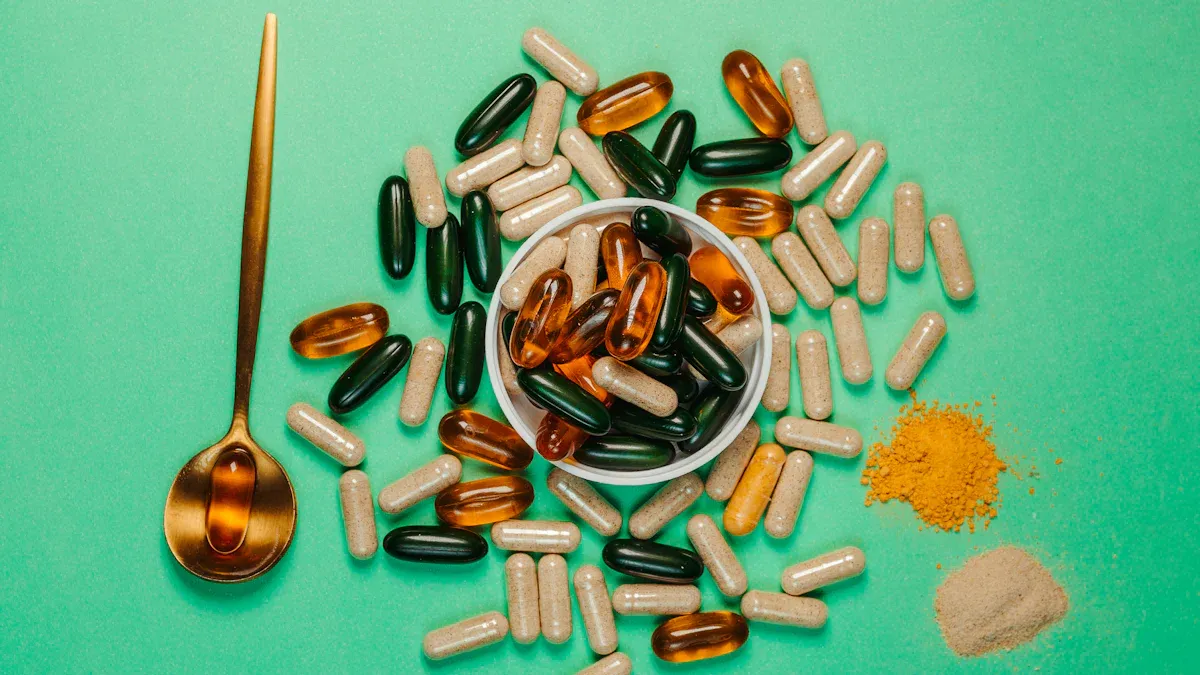Digestive Enzymes 101 A Simple Breakdown
Table of Contents

You have digestive enzymes inside your body. They are tiny proteins that act like scissors, breaking down food for nutrient absorption. Your digestive process relies on three main helpers, which you can remember as the A-P-L of digestion.
- Amylase: Tackles carbs.
- Protease: Processes proteins.
- Lipase: Breaks down fats.
The market for digestive enzyme supplements shows a growing interest in this topic. It is projected to expand from approximately $2.3 billion in 2024 to over $4.1 billion by 2034.
What Are Digestive Enzymes?

Your body uses different types of enzymes to turn food into fuel. These tiny protein workers are essential for good health. Let’s explore the main types of digestive enzymes and their specific jobs. Your digestive system relies on a team of helpers, but we will focus on the big three: amylase, protease, and lipase.
Amylase: The Carbohydrate Crusher 🍞
Your body begins digesting carbohydrates the moment you start chewing. This is thanks to amylase, the enzyme responsible for breaking down starches into simpler sugars.
The process starts in your mouth. Your salivary glands produce a form of amylase that immediately gets to work on foods like bread and potatoes. Digestion then pauses in the stomach’s acidic environment. It picks back up in the small intestine, where your pancreas releases more amylase to finish the job.
Did You Know? 💡 The journey of a carbohydrate isn’t over after amylase is done. The enzyme breaks large starches into smaller sugars like maltose. Other enzymes then step in to convert these into glucose, the simple sugar your cells use for energy.
There are different forms of this enzyme. The main one in your body is alpha-amylase. It is very effective at its job. Studies show that digestive enzyme supplements containing amylase can significantly increase the release of sugars from food, proving its power in carbohydrate digestion.
Protease: The Protein Processor 🍗
You need protease to get the most out of protein-rich foods like meat, beans, and eggs. This enzyme acts like a pair of molecular scissors. It snips large, complex protein chains into smaller pieces called amino acids. Your body then absorbs these amino acids to build and repair tissues.
The journey for protease begins in your stomach.
- Stomach: Here, an enzyme called pepsin starts breaking down proteins in a highly acidic setting.
- Pancreas: This organ produces several key proteases, including trypsin and chymotrypsin.
- Small Intestine: The pancreatic proteases are sent to the small intestine. They work best in a less acidic environment to continue dismantling proteins into absorbable amino acids.
Lipase: The Fat Fighter 🥑
Lipase is the enzyme your body uses to digest fats. It breaks down fats, also known as triglycerides, into smaller, manageable molecules: fatty acids and glycerol. Your body uses these molecules for energy and other vital functions.
While some lipase is present in your mouth and stomach, the pancreas is the main producer of this fat-digesting enzyme. It releases lipase into your small intestine to handle the fats from your diet.
For lipase to work well, it needs the right conditions. The pH level, or acidity, of its environment is very important for all digestive enzymes. The table below shows the optimal pH for pancreatic lipase.
| Enzyme | Optimal pH |
|---|---|
| Pancreatic Lipase | 8.0 |
| Pancreatic Amylase | 6.7 – 7.0 |
| Trypsin (a protease) | 7.8 – 8.7 |
As you can see, the enzymes in your small intestine work best in a neutral to slightly alkaline environment. This allows for the complete digestion of fats, proteins, and carbohydrates.
Why Your Body Needs Enzymes
Your body needs digestive enzymes to unlock the nutrients in your food. You could eat a perfectly healthy meal, but without proper enzyme function, your body cannot get the full benefit. This is because enzymes are essential for nutrient absorption. A failure in this process can lead to malnourishment, even with a good diet. When your body struggles with absorption, it sends signals that something is wrong.
Many common digestive complaints are signs of poor enzyme activity. If you experience discomfort after eating, you might have a digestive enzyme insufficiency.
Common Signs of Poor Digestion:
- Gas and Bloating: Trouble digesting certain sugars, like those in beans or dairy, often causes these symptoms.
- Indigestion: Some forms of upper stomach discomfort, known as functional dyspepsia, have been linked to a lack of enzymes.
- Diarrhea: Conditions that lower enzyme production, such as chronic pancreatitis, can interfere with digestion and lead to diarrhea.
These issues happen because undigested food ferments in your gut. A digestive enzyme insufficiency prevents the complete breakdown of food, which impacts nutrient absorption. This lack of proper absorption can cause problems beyond your stomach, including fatigue, unexplained weight loss, and brittle hair and nails. Various health conditions or even past surgeries can cause a digestive enzyme insufficiency. If you regularly experience these symptoms, getting the right digestive enzyme support from a healthcare professional is an important step toward better health.
Understanding Digestive Enzyme Supplements

You might see many digestive enzyme supplements on store shelves. However, most healthy people do not need them. Your body is already an expert at producing the digestive enzymes it requires. You can also support your system by eating certain foods. There are several natural sources of digestive enzymes you can add to your diet.
Nature’s Helpers 🍍 Foods like pineapple and papaya contain naturally occurring digestive enzymes. Pineapple has bromelain, and papaya has papain. Interestingly, green, unripe papayas contain about 5000% more papain than ripe ones. Exploring natural sources of digestive enzymes can be a great first step.
Despite their popularity, there is little clinical proof that over-the-counter enzyme supplements benefit healthy individuals. While some data suggests potential benefits, the research is not strong enough to recommend them for general digestive health.
If you have persistent digestive problems, you should consult a doctor instead of self-treating with enzyme supplements. These symptoms could point to a medical condition causing a digestive enzyme insufficiency. A healthcare professional can determine if you have a condition like exocrine pancreatic insufficiency (EPI). A diagnosis for EPI is often based on your symptoms and medical history.
For a diagnosed digestive enzyme insufficiency, a doctor may prescribe a specific therapy. Prescription enzyme supplements, such as Pancrelipase (CREON), are designed to replace the enzymes your pancreas isn’t making. These powerful digestive enzyme supplements work by releasing enzymes at the right spot in your small intestine to help you digest food properly.
Taking digestive enzyme supplements without medical supervision can lead to unwanted side effects.
- Upset stomach or cramping
- Nausea and diarrhea
- Headaches or dizziness
- Potential allergic reactions
Always talk to your doctor before starting any new digestive enzyme supplements. They can provide guidance and ensure you get the right support for your health needs.
Your digestive system is a powerful factory. It uses specific enzymes for different jobs. Remember the simple breakdown:
- Amylase crushes carbohydrates.
- Protease processes proteins.
- Lipase fights fats.
Your body typically produces all the enzymes you need for good health. You can trust your system to handle digestion effectively.
Important Note 📝 Always talk to a healthcare professional before taking any supplements. They can provide the best guidance for your specific health needs and ensure your safety.
FAQ
What is the difference between enzymes and probiotics?
You can think of them as two different helpers. Probiotics are living bacteria that support your gut health. Digestive enzymes are non-living proteins that break down your food into nutrients. They both help your digestion but do very different jobs.
When should you take digestive enzyme supplements?
You should take enzyme supplements just before or with your meals. This timing allows the enzymes to mix with your food in the stomach. They can then work properly to help you digest. Always follow the specific instructions from your healthcare provider.
Can you get digestive enzymes from food?
Yes, certain foods provide natural digestive enzymes. For example, pineapple contains bromelain, and papaya contains papain. Eating these fresh fruits can give your digestive system a small boost. 🍍
Are digestive enzyme supplements safe for everyone?
No, they are not for everyone. Supplements can cause side effects like an upset stomach or nausea. You should always talk to a doctor before taking them. A doctor can tell you if they are right and safe for your specific health needs.

Poseidon
Master of Nutritional Epidemiology, University of Copenhagen, Herbal Functional Nutrition Researcher
Focus: The scientific application of natural active ingredients such as Tongo Ali, Horny Goat Weed, and Maca to sexual health and metabolic regulation.
Core Focus:
Men: Use a combination of Tongo Ali (an energizing factor) + Maca (an energy reserve) to improve low energy and fluctuating libido.
Women: Use a combination of Horny Goat Weed (a gentle regulator) + Maca (a nutritional synergist) to alleviate low libido and hormonal imbalances.
Stressed/Middle-Aged Adults: This triple-ingredient synergy supports metabolism, physical strength, and intimacy.
Product Concept:
Based on traditional applications and modern research (e.g., Tongo Ali promotes testosterone-enhancing enzyme activity, and icariin provides gentle regulation), we preserve core active ingredients and eschew conceptual packaging—using natural ingredients to address specific needs.
Simply put: I'm a nutritionist who understands "herbal actives." I use scientifically proven ingredients like Tongo Ali, Epimedium, and Maca to help you make "sexual health" and "nutritional support" a daily routine.
